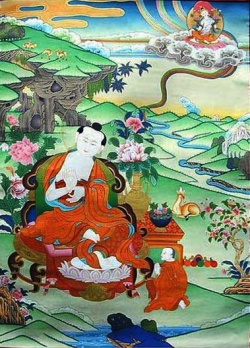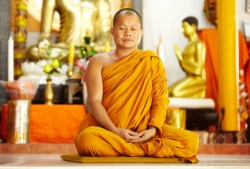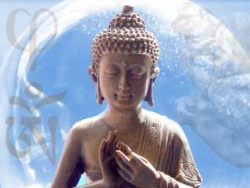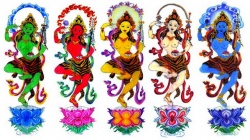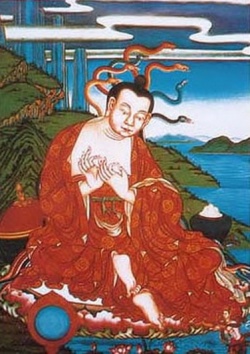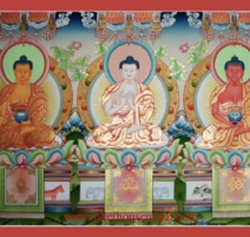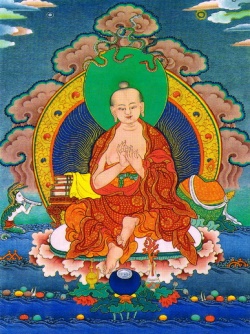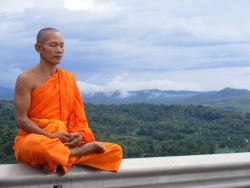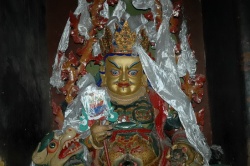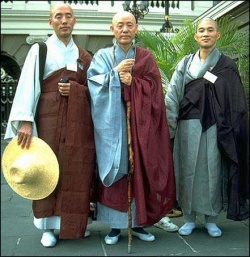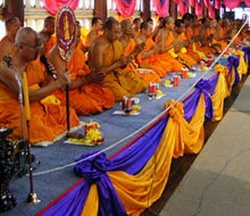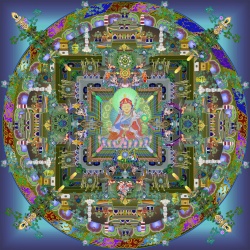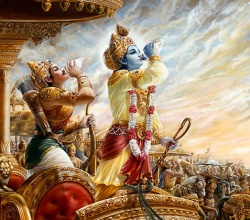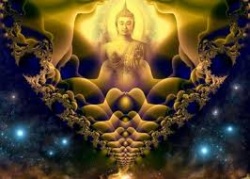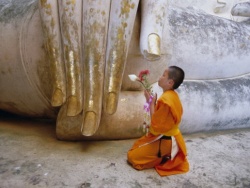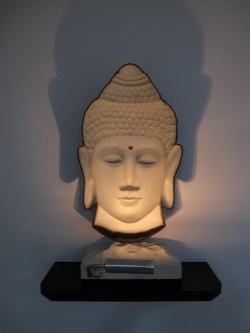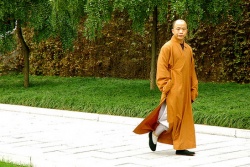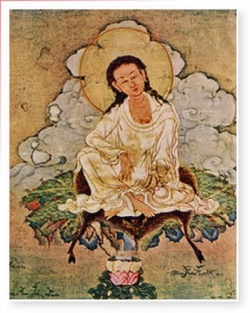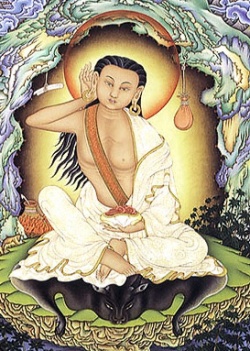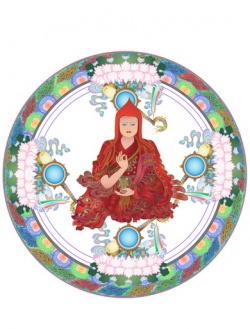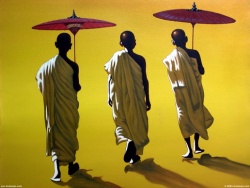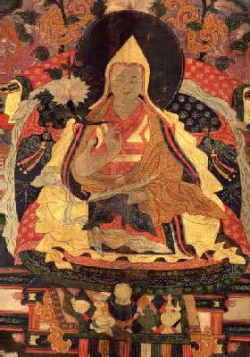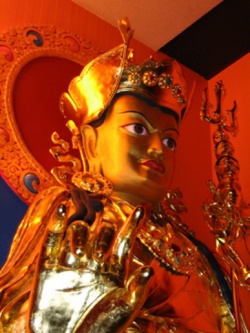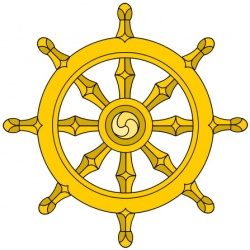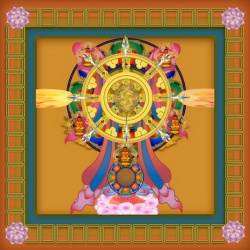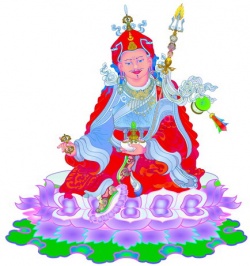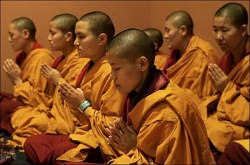Difference between revisions of "The Ten Armies of Mara"
(Created page with " <poem> Meditation can be seen as a war between wholesome and unwholesome mental states. On the unwholesome side are the forces of the kilesas, al...") |
|||
| Line 1: | Line 1: | ||
| − | + | {{DisplayImages|2695|3379|623|3071|1513|2707|1048|2703|2463|1631|3021|2337|2983|2503|264|1348|3402|358|1740|2287|1639|998|2505|717|1678|1102|1917|3036|3155|1458|561|2873|1101|2796|3033}} | |
<poem> | <poem> | ||
[[Meditation]] can be seen as a [[war]] between [[wholesome]] and [[unwholesome]] [[mental states]]. On the [[unwholesome]] side are the forces of the [[kilesas]], also known as "The Ten Armies of [[Mara]]." In [[Pali]], [[Mara]] means killer. He is the {{Wiki|personification}} of the force that kills [[virtue]] and also kills [[existence]]. His armies are poised to attack all [[yogis]]; they even tried to overcome the [[Buddha]] on the night of his [[enlightenment]]. | [[Meditation]] can be seen as a [[war]] between [[wholesome]] and [[unwholesome]] [[mental states]]. On the [[unwholesome]] side are the forces of the [[kilesas]], also known as "The Ten Armies of [[Mara]]." In [[Pali]], [[Mara]] means killer. He is the {{Wiki|personification}} of the force that kills [[virtue]] and also kills [[existence]]. His armies are poised to attack all [[yogis]]; they even tried to overcome the [[Buddha]] on the night of his [[enlightenment]]. | ||
| Line 14: | Line 14: | ||
Gain, renown, [[honor]] and whatever [[fame]] is falsely received (are the ninth), | Gain, renown, [[honor]] and whatever [[fame]] is falsely received (are the ninth), | ||
And whoever both extols himself and disparages others (has fallen victim to the tenth). | And whoever both extols himself and disparages others (has fallen victim to the tenth). | ||
| − | That is your {{Wiki|army}}, [[Namuci | + | That is your {{Wiki|army}}, [[Namuci Mara]], the striking force of {{Wiki|darkness}}. |
One who is not a [[hero]] cannot conquer it, but having conquered it, one obtains [[happiness]]. | One who is not a [[hero]] cannot conquer it, but having conquered it, one obtains [[happiness]]. | ||
To overcome the forces of {{Wiki|darkness}} in our own [[minds]], we have the [[wholesome]] power of satipa??hana [[vipassana]] [[meditation]], which gives us the sword of [[mindfulness]], as well as strategies for attack and defense. | To overcome the forces of {{Wiki|darkness}} in our own [[minds]], we have the [[wholesome]] power of satipa??hana [[vipassana]] [[meditation]], which gives us the sword of [[mindfulness]], as well as strategies for attack and defense. | ||
In the [[Buddha's]] case, we know who won the victory. Now, which side will win over you? | In the [[Buddha's]] case, we know who won the victory. Now, which side will win over you? | ||
| + | |||
FIRST ARMY: SENSE PLEASURE | FIRST ARMY: SENSE PLEASURE | ||
| + | |||
[[Sense]] [[pleasure]] is the First {{Wiki|Army}} of [[Mara]]. Due to previous good [[actions]] in {{Wiki|sensual}} or material [[realms]], we find ourselves [[reborn]] in this [[world]]. Here, as in other {{Wiki|sensual}} spheres, [[beings]] are faced with a wide assortment of appealing [[sense objects]]. Sweet {{Wiki|sounds}}, rich {{Wiki|smells}}, beautiful [[ideas]], and other delightful [[objects]] {{Wiki|touch}} all our [[six sense doors]]. As a natural result of encountering these [[objects]], [[desire]] arises. [[Pleasant]] [[objects]] and [[desire]] are the two bases of [[sense]] [[pleasure]]. | [[Sense]] [[pleasure]] is the First {{Wiki|Army}} of [[Mara]]. Due to previous good [[actions]] in {{Wiki|sensual}} or material [[realms]], we find ourselves [[reborn]] in this [[world]]. Here, as in other {{Wiki|sensual}} spheres, [[beings]] are faced with a wide assortment of appealing [[sense objects]]. Sweet {{Wiki|sounds}}, rich {{Wiki|smells}}, beautiful [[ideas]], and other delightful [[objects]] {{Wiki|touch}} all our [[six sense doors]]. As a natural result of encountering these [[objects]], [[desire]] arises. [[Pleasant]] [[objects]] and [[desire]] are the two bases of [[sense]] [[pleasure]]. | ||
Revision as of 14:11, 1 April 2014
Meditation can be seen as a war between wholesome and unwholesome mental states. On the unwholesome side are the forces of the kilesas, also known as "The Ten Armies of Mara." In Pali, Mara means killer. He is the personification of the force that kills virtue and also kills existence. His armies are poised to attack all yogis; they even tried to overcome the Buddha on the night of his enlightenment.
Here are the lines the Buddha addressed to Mara, as recorded in the Sutta Nipata:
Sensual pleasures are your first army,
Discontent your second is called.
Your third is hunger and thirst,
The fourth is called craving.
Sloth and torpor are your fifth,
The sixth is called fear,
Your seventh is doubt,
Conceit and ingratitude are your eighth,
Gain, renown, honor and whatever fame is falsely received (are the ninth),
And whoever both extols himself and disparages others (has fallen victim to the tenth).
That is your army, Namuci Mara, the striking force of darkness.
One who is not a hero cannot conquer it, but having conquered it, one obtains happiness.
To overcome the forces of darkness in our own minds, we have the wholesome power of satipa??hana vipassana meditation, which gives us the sword of mindfulness, as well as strategies for attack and defense.
In the Buddha's case, we know who won the victory. Now, which side will win over you?
FIRST ARMY: SENSE PLEASURE
Sense pleasure is the First Army of Mara. Due to previous good actions in sensual or material realms, we find ourselves reborn in this world. Here, as in other sensual spheres, beings are faced with a wide assortment of appealing sense objects. Sweet sounds, rich smells, beautiful ideas, and other delightful objects touch all our six sense doors. As a natural result of encountering these objects, desire arises. Pleasant objects and desire are the two bases of sense pleasure.
Our attachments to family, property, business and friends also constitute the First Army. Normally for a sentient being, this army is very difficult to overcome. Some humans fight it by becoming monks and nuns, leaving behind their families and all that they cling to. Yogis on retreat leave behind their family and occupation temporarily in order to combat the force of attachment which ties us to the six kinds of sense objects.
Anytime you practice meditation, especially in a retreat, you leave behind a large number of pleasant things. Even with this narrowing in range, though, you still find that some parts of your environment are more desirable than others. At this time it is useful to recognize that you are dealing with Mara, the enemy of your freedom.
SECOND ARMY: DISSATISFACTION
The Second Army of Mara is dissatisfaction with the holy life, with the meditation practice in particular. On a retreat, you may find yourself dissatisfied and bored: with the hardness or the height of your cushion, with the food you are given, with any of the elements of your life during the time of practice. Some issue crops up and, as a result, you cannot quite immerse yourself in the delight of meditation. You may begin to feel that this is actually the fault of the practice.
To combat this discontent, you must become an abhirati, a person who is delighted in and devoted to the Dhamma. Having found and implemented the correct method of practice, you begin to overcome the hindrances. Rapture, joy and comfort will arise naturally from your concentrated mind. At this time you realize that the delight of the Dhamma is far superior to sense pleasures. This is the attitude of an abhirati. However, if you are not thorough and careful in your practice, you will not find this subtle and wonderful taste of the Dhamma, and any difficulty in your practice will cause aversion to arise in you. Then Mara will be victorious.
The overcoming of difficulty in vipassana practice is, again, like warfare. The yogi will use an offensive, defensive or a guerrilla style of combat depending on his or her abilities. If he or she is a strong fighter, the yogi will advance. If weak, he or she may withdraw temporarily, but not in a helter-skelter fashion, reeling and running in disorder. Rather, the withdrawal will be strategic, planned and executed with the aim of gathering strength to win the battle at last.
Sometimes discontent with the environmental or other supports of meditation practice is not entirely Mara's fault - not entirely due to the wanderings of a greedy mind. Nonetheless, pervasive discontent may interfere with meditative progress. To allow for meditation, certain necessities of life must be available. Yogis must have proper shelter and meals, as well as sundry other help. With these requirements met they can proceed wholeheartedly to practice meditation. The need for a suitable environment is the fourth of nine causes for development of the controlling faculties, and was discussed at length in the preceding chapter. If you find a deficiency in your environment that you are certain is hindering your meditation, it is all right to take reasonable steps to correct it. Of course, you should be honest with yourself and others; make sure that you are not merely succumbing to Mara's Second Army.
THIRD ARMY: HUNGER AND THIRST
Is food the problem? Perhaps a yogi has to overcome desire and dissatisfaction, only to be attacked again by Mara's Third Army, hunger and thirst. In the days of old and even now, Buddhist monks and nuns have depended for their food on the generosity of lay people. The normal practice for a monk is to go for an alms round every day in the community or village that supports him. Sometimes a monk may live in a secluded area and take all his support from a small group of families. One day his needs will be well taken care of, another day not. The same goes for lay yogis. At a retreat, the food is not quite like home. You do not get the sweet things you are fond of; or the sour, salty and rich foods you are accustomed to. Agitated by missing such tastes, you cannot concentrate and thus are unable to see the Dhamma.
In the world also, one can spend a lot of money in a restaurant and then not like the dish. Rarely, in fact do human beings get everything precisely as they like. They may hunger and thirst not only for food, but also for clothing, entertainment, and activities either reassuringly familiar, or exotically exciting. This notion of hunger and thirst relates to the entire range of needs and requirements.
If you are easily contented, adopting an attitude of being grateful for whatever you receive, Mara's Third Army will not bother you very much. One cannot always do every thing one wishes to do, but it is possible to try to remain within what is beneficial and appropriate. If you concentrate your energy on furthering your meditation practice, you will be able to taste the real taste of the Dhamma, which is incomparably satisfying. At such a time, the Third Army of Mara will seem an army of toy soldiers to you.
Otherwise it is hard to adjust to hunger and thirst. They are uncomfortable feelings which no one really welcomes.
When they strike, if there is no mindfulness, the mind inevitably begins to scheme. You come up with fantastic justifications for getting what you want - for the sake of your practice! Your mental health! To aid your digestion! Then you begin moving around to get the things you desire. Your body gets involved in satisfying your craving.
FOURTH ARMY: CRAVING
Craving is the Fourth Army of Mara. At times a monk's bowl may not be quite full at the end of his normal alms round, or some of the things most suitable for his diet have not yet appeared in it. Instead of going home to the monastery, he may decide to continue his alms round. Here is a new route, as yet untried - on it he might get the tidbit he desires. New routes like this can grow quite long.
Whether one is a monk or not one might be familiar with this pattern. First comes craving, then planning, then moving about to materialize these schemes. This whole process can be very exhausting to mind and body
FIFTH ARMY: SLOTH AND TORPOR
Thus, the Fifth Army of Mara marches in. It is none other than sloth and torpor, drowsiness. The difficulties caused by sloth and torpor are worth dwelling on, for they are surprisingly great. Torpor is the usual translation of the Pali word thina, which actually means a weak mind, a shrunken and withered, viscous and slimy mind, unable to grasp the meditation object firmly.
As thina makes the mind weak, it automatically brings on weakness of body. The sluggish mind cannot keep your sitting posture erect and firm. Walking meditation becomes a real drag, so to speak. The presence of thina means that atapa, the fiery aspect of energy, is absent. The mind be comes stiff and hard; it loses its active sharpness.
Even if a yogi has good energy to begin with, sloth can envelop him or her so that an additional burst of energy will be required to burn it away. All the positive forces of mind are at least partially blocked. The wholesome factors of energy and mindfulness, aim and contact, are enveloped in the shroud of weakness; their functions are retarded. This situation as a whole is spoken of as Thina middha, thina being the mental factor of torpor, and middha referring to the condition of the consciousness as a whole when the factor of torpor is present.
In one's practical experience, it is not worthwhile to try to distinguish between the two components of thina and middha. The general state of mind is familiar enough. Like imprisonment in a tiny cell, sloth is a restricted state in which no wholesome factor is free to carry on its proper activity. This obstruction of wholesome factors is why sloth and torpor together are called a hindrance. Eventually Mara's Fifth Army can bring one's practice to a complete standstill. A twitching sensation comes to the eyelids, the head suddenly nods forward... How can we overcome this noxious state? Once when the Venerable Maha Moggallana, one of the Buddha's two chief disciples, was meditating in the forest, thina middha arose. His mind shrank and withered, as unworkable as a piece of butter that hardens in the cold. At this point the Lord Buddha looked into the Venerable Maha Moggallana's mind. Seeing his plight, he approached and said, "My son Maha Moggallana, are you drowsy, are you sleepy, are you nodding?"
The elder replied, "Yes, Lord, I am nodding." He was frank and candid in his reply. the Buddha said, "Listen, my son, I will now teach you eight techniques of overcoming sloth and torpor."
Eight Ways to Stay Awake
The first is to change one's attitude. When torpor attacks, one may be tempted to surrender to thoughts like, "I'm so sleepy. It's not doing me any good just to sit here in a daze. May be I'll lie down for a minute and gather my energy." As long as you entertain such thoughts, the mental state of sloth and torpor will be encouraged to remain.
If, on the other hand, one states decisively, "I'll sit through this sloth and torpor, and if it recurs I still won't give in to it," this is what the Buddha meant by changing one's attitude. Such determination sets the stage for overcoming the Fifth Army of Mara.
Another occasion to change one's attitude is when meditation practice becomes quite easy and smooth. There comes a point where you have more or less mastered following the rise and fall of the abdomen, and not much effort is needed to observe it well. It is quite natural to relax, sit back and watch the movement very coolly. Due to this relaxation of effort, sloth and torpor easily creep in. If this happens, you should either try to deepen your mindfulness, looking more carefully into the rise and fall, or else increase the number of objects of meditation.
There is a specific technique for adding more objects. It requires greater effort than simply watching the abdomen, and thus it has a revivifying effect. The mental labels to use are, "rising, falling, sitting, touching? When you note "sitting," you shift your awareness to the sensations of the entire body in the sitting posture. Noting "touching," you focus on the touch sensations at one or more small areas, about the size of a quarter. The buttocks arc convenient. During this "touching" note you should always return to the same chosen areas, even it you cannot always find sensations there. The heavier the state of sloth, the more touch points you should include, up to a maximum of six or so. When you have run through the course of touch points, return attention to your abdomen and repeat the series of notes from the beginning. This change of strategy can be quite effective; but it is not infallible.
The second antidote In drowsiness is to reflect on inspiring passages you remember or have learned by heart, trying to fathom their deepest meanings. Perhaps you have lain awake at night pondering the meaning of some event. If so, you understand the function of the Buddha's second antidote to sloth and torpor. In Buddhist psychology, when thinking is analyzed in terms of its components, one component is the mental factor of vitakka or aim. This mental factor has the capacity to open and refresh the mind, and is the specific antidote to sloth and torpor.
The third strategy for dealing with sloth is to recite those same passages aloud. If you are meditating in a group, it goes without saying that you should recite only loud enough for your own benefit.
Resort to more drastic measures if your mind still has not perked up. Pull on your ears; rub your hands, arms, legs and face. This stimulates the circulation and so freshens you up a bit.
If drowsiness persists, get up mindfully and wash your face. You could put in some eye-drops to refresh yourself.
If this strategy fails, you are advised to look at a lighted object, such as the moon or an electric bulb; this should lighten up your mind. Clarity of mind is a kind of light. With it, you can make a renewed attempt to look clearly at the rising and falling from beginning to end. If none of these techniques work, then you should try some brisk walking meditation with mindfulness. Finally, a graceful surrender would be to go to bed. If sloth and torpor are persistent over a long period, constipation could be responsible; if this is the case, consider measures to gently clear the bowels.
SIXTH ARMY: FEAR
The Sixth Army of Mara is fear and cowardliness. It easily attacks yogis who practice in a remote place, especially if the level of ardent effort is low after an attack of sloth and torpor. Courageous effort drives out fear. So does a clear perception of the Dhamma which comes as a result of effort, mindfulness and concentration. The Dhamma is the greatest protection available on earth: faith in, and practice of the Dhamma are therefore the greatest medicines for fear. Practicing morality ensures that one's future circumstances will be wholesome and pleasant; practicing concentration means that one suffers less from mental distress; and practicing wisdom leads toward nibbana, where all fear and danger have been surpassed. Practicing the Dhamma, you truly care for yourself, protect yourself, and act as your own best friend.
Ordinary fear is the sinking form of anger. You cannot face the problem, so you show no reaction outwardly and wait for the opportunity to run away. But if you can face your problems directly, with an open and relaxed mind, fear will not arise. On a meditation retreat, yogis who have lost touch with the Dhamma feel fear and lack of confidence in relating to other yogis and their teacher. For example, some yogis are severely attacked by sloth and torpor. Such people have been known to sleep through five hour-long sittings in a row. They may have only a few minutes of clear awareness in an entire day. Such yogis tend to feel inferior, shy and embarrassed, especially if they begin to compare their own practice to that of other yogis who seem to be in deep samadhi all the time. At times in Burma, torpid yogis slip away for a couple of days and miss their interviews. A few slip all the way home! They are like school children who have not done their homework. If such yogis would apply courageous effort, their awareness would become hot like the sun, burning off the clouds of sleepiness. Then they could face their teachers boldly, ready to report what they have seen for themselves in the light created by Dhamma practice.
No matter what problem you may encounter in your meditation practice, try to have the courage and honesty to report it to your teacher. Sometimes yogis may feel that their practice is falling apart, when actually it is going fine. A teacher who is trustworthy and well-qualified can help you to overcome such insecurities, and you can continue on the path of Dhamma with energy, faith and confidence.
SEVENTH ARMY: DOUBT
Sloth and torpor is only one reason why yogis may begin to doubt their own capacities. Doubt is the Seventh Army of Mara, dreadful and fearsome. When a yogi begins to slip in his or her practice, he or she will probably begin to lose self-confidence. Pondering the situation does not usually lead to improvement. Instead, doubt arises and slowly spreads: first as self-doubt, then as doubt of the method of practice. It may even extend to becoming doubt of the teacher. Is the teacher competent to understand this situation? Perhaps this yogi is a special case and needs a special new set of instructions. The experiences narrated by fellow yogis must be imaginary. Every conceivable aspect of practice becomes dubious.
The Pali word for this Seventh Army is vicikiccha, which means more than simple doubt. It is the exhaustion of mind that comes about through conjecture. A yogi attacked by sloth and torpor, for example, will not be able to muster the continuous attention that fosters intuitive vipassana insight. If such a yogi were mindful, he or she might experience mind and matter directly, and see that these two are connected by cause and effect. If no actual observation is made, however, the true nature of mind and matter will remain obscure. One simply cannot understand what one hasn't yet seen. Now this unmindful yogi begins to intellectualize and reason: "I wonder what mind and matter are composed of, what their relationship is," Unfortunately, he or she can only interpret experiences based on a very immature depth of knowledge, mixed up with fantasy. This is an explosive mixture. Since the mind is unable to penetrate into the truth, agitation arises, and then perplexity, indecisiveness, which is another aspect of vicikiccha. Excessive reasoning is exhausting.
Immaturity of insight prevents a yogi from reaching a firm and convinced position. Instead, his or her mind is condemned to run about among various options. Remembering all the meditative techniques he or she has heard of, a yogi might try a bit from here and a bit from there. This person falls into a great pot of chop suey, perhaps to drown. Vicikiccha can be a terrible obstacle in practice. The proximate cause of doubting conjecture is lack of proper attention, an improper adjustment of the mind in its search for truth. Proper attention, then, is the most direct cure for doubt. If you look correctly and in the right place, you will see what you are looking for: the true nature of things. Having seen this for yourself, you will have no more doubt about it.
To create the proper conditions for wise attention, it is important to have a teacher who can put you on the path leading to truth and wisdom. The Buddha himself said that one who is intent on finding the truth should seek out a reliable and competent teacher. If you cannot find a good teacher and follow his or her instructions, then you must turn to the plethora of meditation literature availably today. Please be cautious, especially if you are an avid reader. If you gain a general knowledge of many techniques and then try to put them all together, you will probably end up disappointed, and even more doubtful than when you started. Some of the techniques may even be good ones, but since you will not have practiced them with proper thoroughness, they will not work and you will feel skeptical of them. Thus you will have robed yourself of the opportunity to experience the very real benefits of meditation practice. If one cannot practice properly, one cannot gain personal, intuitive, real understanding of the nature of phenomena. Not only will doubt increase, but the mind will become very hard and stiff, attacked by kodha, aversion and associated mental states. Frustration and resistance might he among them.
The Thorny Mind
Kodha makes the mind hard and rigid as a thorn. Under its influence, a yogi is said to be pricked by the mind, like a traveler thrashing through a bramble thicket, suffering at every step. Since kodha is a great impediment in many yogis' meditation practice, I will deal with it in some detail in hopes that readers can learn to overcome it. In general, it results from two kinds of mental states: firstly from doubt, and secondly from what are known as "the mental fetters."
There are five kinds of doubt which load to the thorny mind. A yogi is pricked by doubt regarding the Buddha, the great master who showed the path to enlightenment. One doubts the Dhamma, the path that leads to liberation; and the sangha, the noble ones who have uprooted some or all of the kilesas. Next come doubts of oneself, of one's own morality and method of practice. Last is doubt of fellow yogis, including one's teacher. When so many doubts are present, the yogi is filled with anger and resistance: his or her mind becomes thorny indeed, he or she will probably feel quite unwilling actually to practice this meditation, seeing it as dubious and unreliable.
All is not lost, however. Wisdom and knowledge are medicine for this state of vicikiccha. One form of knowledge is reasoning. Often persuasive words can coax a doubting yogi from the brambles: a teacher's reasoning, or an inspiring and well-constructed discourse. Returning to the clear path of direct observation, such yogis breathe great sighs of relief and gratitude. Now they have the chance to gain personal insight into the true nature of reality. If they do attain insight, then a higher level of wisdom becomes their medicine for the thorny mind.
Failure to return to the path, however, may allow doubt to reach its incurable stage.
The Five Mental Fetters
The thorny mind arises not only from doubt, but also from another set of causes known as the five mental fetters. When these mental letters are present, the mind suffers from hard and prickling states of aversion, frustration and resistance. But these fetters can be overcome. Vipassana meditation clears them automatically from the mind. If they do manage to intrude upon one's practice, identifying them is the first step toward recovering a broad and flexible mental state.
The first mental fetter is to be chained to the various objects of the senses. Desiring only pleasant objects, one will be dissatisfied with what is really occurring in the present moment. The primary object, the rising and falling of the abdomen, may seem inadequate and uninteresting in comparison with one's fantasies. If this dissatisfaction occurs, one's meditative development will be undermined.
The second fetter is over-attachment to one's own body, sometimes spoken of as excessive self-love. A variation is the projection of attachment and possessiveness onto another person and his or her body. This is the third fetter, and it is such a common situation that I hardly need elaborate.
Excessive sell-love can be a significant hindrance in the course of practice. When one sits for extended periods, unpleasant sensations invariably arise, some of them rather intense. You may begin to wonder about your poor legs. Will you ever walk again? You may decide to open your eyes and stretch. At this point, continuity of attention usually breaks apart; momentum is lost. Tender consideration for one's own body can sometimes supplant the courage we need to probe into the actual nature of pain.
Personal appearance is another area where this second fetter can arise. Some human beings depend on stylish clothes and makeup to feel happy. If ever they lose access to these external supports (perhaps on a retreat where makeup and flamboyant fashions are inappropriate distractions), these people feel as if something is missing, and worry can interfere with their progress. The fourth fetter of mind is to be chained to food. Some people like to eat large amounts, others have many whims and preferences. People whose first concern is the satisfaction of their bellies tend to find greater bliss in snoozing than in practicing mindfulness. A few yogis have the opposite problem, worrying constantly about gaining weight. They, too, are chained to what they eat.
The fifth fetter of mind is to practice with the goal of gaining rebirth in a deva world. Besides effectively basing one's practice on craving for sensual pleasures, this is also to set one's sights much too low. For information on the disadvantages of deva life, see the last chapter of this book, "Chariot to Nibbana."
By diligent practice one overcomes these five fetters. By the same means, (one overcomes doubt and the anger that follows it. Relieved from thorny discomfort, the mind be comes crystal clear and bright. This bright mind is happy to make the preliminary effort that sets your feet on the path of practice, the steady effort that moves you along into deeper meditation, and the culminating effort that brings liberation at the higher stages of practice. This three fold effort - actually directed toward keeping the mind alert and observant - is the best and most natural defense strategy against Mara's Seventh Army of doubt. Only when the mind slips from the object, as it will in times of slackening effort, do the conjectures and equivocations of doubt have a chance to set in.
Faith Clarifies the Mind
The quality of faith, or saddha, also has the power to clarify the mind and clear away clouds of doubt or aversion. Imagine a pail of murky river water, full of sediment. Some chemical substances, such as alum, have the power to make suspended particles settle quickly, leaving clear water behind. Faith works just like this. It settles impurities, and brings a sparkling clarity to the mind.
A yogi ignorant of the virtues of the Triple Gem - the Buddha, Dhamma and Sangha - will doubt its value as well as that of the meditation practice, and will be overcome by the Seventh Army of Mara. Such a yogi's mind is like a bucket of murky river water. But informed of these virtues through reading, discussions and Dhamma talks, a yogi can gradually settle doubts and begin to arouse faith.
With faith comes the desire to meditate, the willingness to exert energy in order to reach the goal. Strong faith is the foundation of sincerity and commitment. Sincerity of practice and commitment to the Dhamma will of course lead to the development of effort, mindfulness and concentration. Then wisdom will unfold in the form of the various stages of vipassana insight.
When circumstances and conditions are right in meditation, wisdom unfolds quite naturally of itself. Wisdom, or insight, occurs when one sees the specific and common characteristics of mental and physical phenomena. Individual characteristics mean the specific traits of mind and matter as experienced directly within you. These are color, shape, taste, smell, loudness, hardness or softness, temperature, movement, and different states of mind. Common characteristics are general to all the manifestations of mind and matter. Objects may differ greatly from one another in terms of individual essence or individual characteristics, yet all are united by the universal traits of impermanence, suffering and absence of an abiding self or essence.
Both these types of characteristics, specific and common, will be understood clearly and unquestionably through the insight that arises naturally out of bare awareness. One attribute of this wisdom or insight is the quality of brightness. It lightens one's field of awareness. Wisdom is like a floodlight breaking into pitch darkness, revealing what was invisible up to now - the specific and common qualities of all objects and mental slates. By wisdom's light, you will see these aspects of any activity you are involved in, be it seeing, smelling, tasting, touching, feeling through the body, or thinking.
The behavioral aspect of wisdom is nonconfusion. When insight is present, the mind is no longer confused by mistaken concepts about, or delusive perceptions of, mind and matter.
Seeing clearly, bright and unconfused, the mind begins to fill with a new kind of faith, known as verified faith. Verified faith is neither blind nor unfounded. It comes directly from personal experience of reality. One might compare it to the faith that raindrops will get us wet. The scriptures formally characterize this kind of faith as a decision based on direct personal experience. Thus, we see a very close association between faith and wisdom.
Verified faith does not arise because you hear statements you find plausible. No comparative study, scholastic research nor abstract reasoning can bring it. Nor is it shoved down your throat by some sayadaw, roshi, rinpoche, or spiritual group. Your own direct, personal, intuitive experience brings about this firm and durable kind of faith.
The most important way to develop and realize verified faith is practice in conformity with instructions from the scriptures. The satipa??hana method of meditation is sometimes viewed as narrow and oversimplified. It may appear so from the outside, but when wisdom begins to unfold during deep practice, personal experience shatters this myth of narrowness. Vipassana brings a wisdom that is far from narrow. It is panoramic and expansive.
In the presence of faith one can spontaneously notice that the mind has become crystal clear and is free from disturbances and pollution. At this time, too, the mind fills with peace and clarity. The function of verified faith is to bring together the five controlling faculties discussed in the last chapter - faith, energy, mindfulness, concentration and wisdom - and to clarify them. They become alert and effective, and their active properties will be more efficiently deployed to bring about a calm, powerful, incisive meditative state - one which is bound to be successful in overcoming not only the Seventh, but all the other nine armies of Mara as well.
Four Powers which Motivate Successful Practice
In practice as much as in worldly endeavors, a vigorous and strong-minded person is quite sure of accomplishing whatever she or he desires. Vigor and strength of mind are only two of the four powers which motivate a successful practice. Chanda is willingness, the first power. Viriya is energy, or vigor, the second. Strength of mind is third, and wisdom or knowledge is the fourth. If these four factors provide the driving force for practice, one's meditation will unfold whether one has any desire to gain results from it or not. One can even reach nibbana in this way.
The Buddha gave a rather homely example which illustrates just how the results of meditation are attained. If mother hen lays an egg with a sincere wish for it to hatch, but then runs off and leaves the egg exposed to nature's elements, the egg will soon rot. If, on the other hand, mother hen is conscientious in her duties toward the egg, sitting on it for long periods every day, the warmth of her body will keep the egg from rotting and will also permit the chick within to grow. Sitting on the egg is mother hen's most important duty. She must do this in the proper way, with her wings slightly spread out to protect the nest from rain. She must also take care not to sit heavily and crack her egg. If she sits in proper style and for sufficient time, the egg will naturally receive the warmth it needs to hatch. Inside the shell, an embryo develops beak and claws. Day by day the shell grows thinner. During mother hen's brief excursions from the nest, the chick inside may see a light that slowly brightens. After three weeks or so, a healthy yellow chick pecks its way out of its claustrophobic space. This result happens regardless of whether the hen foresaw the outcome. All she did was sit on the egg with sufficient regularity.
Mother hens are very dedicated and committed to their task. At times they would rather be hungry and thirsty than get up from the egg. If they do have to get up, they go about their errands as efficiently as possible and then return to their sitting practice.
I am not recommending that you skip meals, or stop drinking liquids, or cease going to the bathroom. I would simply like you to be inspired by the hen's patience and persistence. Imagine if she became fickle and restless, sitting for a few minutes and then going out to do something else for a few minutes. Her egg would quickly rot, and the chick would lose its chance for life.
So, too, for the yogi. If during sitting meditation, you are prone to giving in to all those whims to scratch, to shift, to squirm, then the heat of energy will not be continuous enough to keep the mind fresh and free from attacks by the rotting influence of mental obscurations and difficulties such as the five mental fetters mentioned above: sense desire, attachment to our own bodies and to the bodies of others, gluttony, and craving for future sensual pleasures as a result of meditation practice.
A yogi who tries to be mindful in each moment generates a persistent stream of energy, like the persistent heat of mother hen's body. This heat aspect of energy prevents the mind from rotting from its exposure to kilesa attacks, and it also permits insight to grow and mature through its developmental stages.
All five of the mental fetters arise in the absence of attention. If one is not careful when there is contact with a pleasurable sense object, the mind will be filled with craving and clinging - the first mental fetter. With mindfulness, however, sense desire is overcome. Similarly, if one can penetrate the true nature of the body, attachment to it disappears. Our infatuation with the bodies of others diminishes in turn. Thus the second and third mental fetters are broken. Close attention to the whole process of eating cuts through gluttony, the fourth mental fetter. If one carries out this whole practice with the aim of realizing nibbana, hankering after mundane pleasures one might obtain in the afterlife will also disappear - wishing for rebirth in subtle realms is the fifth fetter of mind. Thus, continuous mindfulness and energy overcome all five fetters. When these fetters are broken, we are no longer bound in a dark, constricted mental state. Our minds are freed to emerge into the light.
With continued effort, mindfulness and concentration, the mind slowly fills with the warmth of the Dhamma which keeps it fresh and scorches the kilesas. The Dhamma's fragrance penetrates throughout, and the shell of ignorance grows thinner and more translucent. Yogis begin to understand mind and matter and the conditionality of all things. Faith based on direct experience arises. They understand directly how mind and matter are inter related by a process of cause and effect, rather than being moved by the actions and decisions of an independent self. By inference, they realize that this same causal process existed in the past and will continue into the future. As practice deepens, one gains deep confidence, no longer doubting oneself and one's practice, other yogis or teachers. The mind is filled with gratitude for the Buddha, the Dhamma and the sangha.
Then one begins to see the appearing and disappearing of things, and realizes their impermanent nature, their suffering and lack of a permanent self. Upon the occurrence of such insights, ignorance of these aspects disappears.
Like the chick about to hatch, at this point you will see a lot of light coming through the shell. Awareness of objects moves ahead at a faster and faster pace; you will be filled with a sort of energy you have never experienced before, and great faith will arise.
If you continue to incubate your wisdom, you will be led forward to the experience of nibbana - magga phala - path and fruition consciousness. You will emerge from the shell of darkness. Just like the chick who, filled with enthusiasm to find itself in the great world, runs about the sunny farmyard with its mother, so too will you be filled with happiness and bliss. Yogis who have experienced nibbana feel a unique, new-found happiness and bliss. Their faith, energy, mindfulness and concentration become particularly strong.
I hope you will take this analogy of mother hen into deep consideration. just as she hatches her chicks without hopes or desire, merely carrying out her duties in a conscientious way, so may you well incubate and hatch your practice.
May you not become a rotten egg.
Captain of My Own Ship
I have spent a lot of time here on doubt and related problems because I know they are quite serious, and I want to help you avoid them. I know personally how much suffering doubt can cause. When I was twenty-eight or twenty-nine years old I began to meditate under the Venerable Mahasi Sayadaw, my predecessor and the head of the lineage of Mahasi Sasana Yeiktha, the meditation center in Rangoon. After about a week at the meditation center, I began to feel quite critical of my fellow meditators. Some monks who were supposed to be meditating were not perfect in their morality; they did not seem scrupulous or meticulous to me. The lay meditators, too, seemed to communicate and move about in an uncivilized, impolite manner. Doubt began to fill my mind. Even my teacher, one of Mahasi Sayadaw's assistants, came under the fire of my critical mind. This man never smiled and was sometimes abrupt and harsh. I felt that a meditation teacher should be filled with softness and solicitude.
A competent meditation teacher can make quite an educated guess about a yogi's situation, based on experience with many yogis as well as on scriptural study. The master who was teaching me was no exception. He saw my practice begin to regress. Guessing that a doubt attack was responsible, he gave me a very gentle and skillful scolding. Afterwards I went back to my room and did some soul-searching. I asked myself. "Why did I come here? To criticize others and test the teacher? No."
I realized that I had come to the center to get rid of as many as I could of the kilesas I had accumulated through my journey in samsara. I hoped to accomplish this goal by practicing the Dhamma of the Buddha in the meditative tradition of the center where I was. This reflection was a great clarification for me.
A simile popped into my mind. It was as if I had been on a sailboat. Out at sea I had been caught in a raging storm. Huge waves rose up and crashed down again on every side. Blown from left to right, up and down, I rocked helplessly in the mighty ocean. Around me other boats were in the same predicament. Instead of managing my own boat, I had been barking orders at the other captains:
"Better put up the sails! Hey, you! Better take them down." If I had remained a busybody, I might well have found myself at the bottom of the ocean.
This is what I learned for myself. After that I worked very hard and entertained no more doubts in my mind. I even became a favorite of my teacher. I hope you can benefit from this experience of mine.
EIGHTH ARMY: CONCEIT AND INGRATITUDE
Having overcome doubt, the yogi begins to realize some aspects of the Dhamma. Unfortunately, the Eighth Army of Mara lies in wait, in the form of conceit and ingratitude. Conceit arises when yogis begin to experience joy, rapture, delight, and other interesting things in practice. At this point they may wonder whether their teacher has actually attained this wondrous stage yet, whether other yogis are practicing as hard as they are, and so forth.
Conceit most often happens at the stage of insight when yogis perceive the momentary arising and passing away of phenomena. It is a wonderful experience of being perfectly present, seeing how objects arise and pass away at the very moment when mindfulness alights on them. At this particular stage, a host of defilements can arise. They are specifically known as the vipassana kilesas, defilements of insight. Since these defilements can become a harmful obstacle, it is important for yogis to understand them clearly. The scriptures tell us that mana or conceit has the characteristic of bubbly energy, of a great zeal and enthusiasm arising in the mind. One overflows with energy and is filled with self-centered, self-glorifying thoughts like, "I'm so great, no one can compare with me."
A prominent aspect of conceit is stiffness and rigidity. One's mind feels stiff and bloated, like a python that has just swallowed some other creature. This aspect of mana is also reflected as tension in the body and posture. Its victims get big-headed and stiff-necked, and thus may find it difficult to bow respectfully to others.
Forgetting Others' Help
Conceit is really a fearsome mental state. It destroys gratitude, making it difficult to acknowledge that one owes any kind of debt to another person. Forgetting the good deeds others have done for us in the past, one belittles them and denigrates their virtues. Not only that, but one also actively conceals the virtues of others so that no one will hold them in esteem. This attitude toward one's benefactors is the second aspect of conceit, rigidity being the first.
All of us have had benefactors in our lives, especially in childhood and younger days. Our parents, for example, gave us love, education and the necessities of life at a time when we were helpless. Our teachers gave us knowledge. Friends helped us when we got into trouble. Remembering our debts to those who have helped us, we feel humble and grateful, and we hope for a chance to help them in turn. It is precisely this gentle state that defeats Mara's Eighth Army.
Yet it is very common to find people who don't recognize the good that has been done for them in the past. Perhaps a lay person finds himself or herself in trouble, and a compassionate friend offers help. Thanks to this help, the person manages to improve his or her circumstances. Later, however, he or she may demonstrate no gratitude at all, may even turn and speak harshly to the erstwhile benefactor. "What have you ever done for me?" Such behavior is far from unknown in this world.
Even a monk may become arrogant, feeling he has reached fame and popularity as a teacher only through his own hard work. He forgets his preceptors and teachers, who may have helped him since his childhood days as a novice. They will have taught him the scriptures, provided him with the requisites of life, instructed him in meditation, given him advice, and admonished him when appropriate, so that he grew up to be a responsible, cultured, civilized young monk.
Come the age of independence, this monk may reveal great talent. He gives good Dhamma talks that are well received by the audience. People respect him, give him many presents and invite him to distant places to teach. Having reached a high station in life, the monk may become rather arrogant. One day, perhaps, his old teacher approaches him and says, "Congratulations! I've been watching you ever since you were a small novice. Having helped you in so many ways, it does my heart good to see you doing so well." The young monk snaps back, "What have you done for me? I worked hard for this."
Problems can occur in the Dhamma family as in any human family. In any family, one should always adopt a positive, loving and compassionate attitude toward resolving difficulties. Imagine how it could be if the members of the world family could get together with love and compassion and consideration for each other when a disagreement arises.
In this world there are ways of solving problems which may not be very fruitful but are unfortunately widespread. Instead of acting directly and from fellowship and love, a family member might start to wash dirty linen in public; might belittle other family members; or criticize their personalities and virtues, either directly or indirectly.
Before hurling insults and accusations at another family member, one should consider one's own state of mind and circumstances. The tendency to lash out, defame and belittle is an aspect of conceit. The scriptures illustrate it with the image of a person enraged, taking up a handful of excrement to fling at his or her opponent. This person befouls himself or herself even before the opponent. So, if there are matters on which we disagree, please let us all try to exercise patience and forgiveness in the spirit of the good-hearted.
Imagine a traveler on a long and arduous journey. In the middle of a long hot day he or she comes across a tree by the side of the road, a leafy tree with deep cool shade. The traveler is delighted, and lies down at the roots of this tree for a nice nap. If the traveler cuts down the tree before he goes on his or her way, this is what the scriptures call ungrateful. Such a person does not understand the benevolence a friend has shown.
We have a responsibility to do more than refrain from chopping down our benefactors. It is true that in this world there are times when we cannot repay what we owe to those who have helped us. We will nonetheless be regarded as a good-hearted person if we can at least remember their acts of benevolence. If we can find a way to repay our debt, we should of course do so. It is quite irrelevant whether our benefactor is more virtuous than we, or is a rascal, or happens to be our equal in virtue. The only requirement for him or her to gain the status of benefactor is to have helped us in the past.
Once upon a time, a man worked very hard to support his mother. As it turned out, she was a promiscuous woman. She tried to hide this from her son, but eventually some gossiping villagers disclosed her activities to him. He answered, "Run along, friends. As long as my mum is happy, whatever she chooses to do is fine. My only duty is to work and support her."
This was a very intelligent young man. He understood the limits of his own responsibility: to repay his debt of gratitude to her who had borne and suckled him. Beyond this, his mother's behavior was her own business.
This man was one of the two types of rare and precious people in the world. The first type of rare and precious person is a benefactor: one who is benevolent and kind, who helps another person for noble reasons. The Buddha was one of these, sparing no effort to help beings liberate themselves from the sufferings of samsara. All of us owe him grateful remembrance, and we might even consider our diligence in practice to be a form of repayment. The second type of rare and precious person is the one who is grateful, who appreciates the good that has been done for him or her, and who tries to repay it when the time is ripe. I hope you will be both types of rare and precious person, and will not succumb to the Eighth Army of Mara.
NINTH ARMY: GAIN, PRAISE, HONOR, UNDESERVED FAME
The Ninth Army of Mara is gain, praise, honor and undeserved fame. When you attain some depth of practice, your manner and behavior will improve. You will become venerable and impressive. You may even start to share the Dhamma with others, or your experience of the Dhamma may manifest outwardly in another way, perhaps in dear expositions of the scriptures. People may feel deep faith in you and may bring you gifts and donations. Word may spread that you are an enlightened person, that you give great Dhamma discourses.
At this point it would be very easy for you to succumb to the Ninth Army of Mara. The honor and respect these people direct toward you could go to your head. You might begin to subtly or overtly try to extract bigger and better donations from your followers. You might decide that you deserve renown because you really are superior to other people. Or, insincere ambition might supplant a genuine wish to help others as your motivation for teaching, for sharing whatever wisdom you have reached in your own practice. Your reflections might run as follows: "Oh, I'm pretty great. I'm popular with many people. I wonder if anyone else is as great as I am. Can I get my devotees to buy me a new car?"
The first battalion of the Ninth Army is material gain: the gifts one receives from devotees and admirers. The reverence of these same people is the second battalion; the third battalion is fame or renown.
In the outer world, Mara's Ninth Army attacks mostly those yogis who've had a good result in meditation. But it is quite unnecessary to have a band of followers. Wishes for gain can attack the most ordinary yogi, in the form of desires for grander accommodations or new outfits to wear while on a retreat. One might feel proud of one's practice and begin wishing to be acknowledged as a great yogi. People whose practice is not very deep are most susceptible to deluding themselves about their own achievements. A yogi who has had an interesting experience or two, but little depth, can become overconfident. He or she may quickly want to step out onto the Dhamma scene and teach other people, thus becoming the object of admiration and praise. Such persons will teach a pseudo-vipassana that is not in accordance with the texts, nor with deep practical experience. They may actually harm their students.
Sincerity
To vanquish this Ninth Army, the motivation behind your effort must be sincere. If you begin practicing only with the hope of getting donations, reverence, or fame, you will never make any progress. Frequent reexamination of motives can be very helpful. If you make genuine, sincere progress and later succumb to greed for gain, you will become intoxicated and negligent. It is said that a person who is intoxicated and negligent will continue a life of peacelessness and be overcome by much suffering. Satisfied with cheap gain, this person forgets the purpose of meditation, performs unskillful actions and fails to cultivate wholesomeness. Her or his practice will regress.
Perhaps, though, we believe there is an end to suffering and that we can attain this end by practicing the Dhamma. This is the sincere motivation that prevents us from falling into greed for worldly gain and fame. Life means coming into being. For humans it means a very painful birth process, with death waiting at the end. In between these two events, we experience falling sick, accidents, the pain of aging. There is also emotional pain, not getting what we desire, depressions and losses, unavoidable associations with persons and objects we dislike. To be freed from all this pain, we sit in meditation, practicing the Dhamma, the path that ends in the supramundane release of nibbana. Some of us go to retreats, leaving behind worldly activities such as business, education, social obligations and the pursuit of pleasure, because we have faith that suffering can come to an end. Actually, we can legitimately consider as a retreat any place where you strive to extinguish the kilesas. When you go to such a place, even if it is the corner of the living room set aside for meditation, the Pali word for you is pabbajita, meaning "one who has gone forth from the world in order to extinguish the kilesas!"
Why would one want to extinguish them? Kilesas, or defilements, have a tremendous power to torture and oppress those who are not free of them. They are likened to a fire which bums and tortures and torments, When kilesas arise in a being, they burn him or her; they bring exhaustion, torment and oppression. There is not a single good thing to be said about the kilesas.
The Three Types of Kilesas
Kilesas are of three kinds: the defilements of transgression, the defilements of obsession, and the latent or dormant defilements.
Defilements of transgression occur when people cannot keep the basic precepts, and perform actions of killing, stealing, sexual misconduct, lying and intoxication.
The second class of kilesas is a bit more subtle. One may not outwardly commit any immoral action, but one's mind will be obsessed with desires to kill and destroy, hurt and harm other beings physically or otherwise. Obsessive wishes may fill the mind: to steal property, manipulate people, deceive others to obtain some desired object. If you have ever experienced this kind of obsession, you know it is a very painful state. If a person fails to control the obsessive kilesas, he or she is likely to hurt other beings in one way or another.
Dormant or latent kilesas are ordinarily not apparent. They lie hidden, waiting for the right conditions to assault the helpless mind. Dormant kilesas may be likened to a person deeply asleep. As such a person awakes, when his or her mind begins to churn, it is as if the obsessive kilesas have arisen. When the person stands up from bed and becomes involved in the day's activities, this is like moving from the obsessive kilesas to the kilesas of transgression.
These three aspects can also be discovered in a matchstick. Its phosphorus tip is like the dormant kilesas. The flame that results from striking is like the obsessive kilesas. The forest fire that ensues from careless handling of the flame is like the kilesas of transgression.
Extinguishing the Kilesas' Fire
If you are sincere in applying sila, samadhi and pañña, you can overcome, extinguish and give up all three kinds of kilesas. Sila puts aside the kilesas of transgression; samadhi suppresses the obsessive ones; and wisdom uproots latent or dormant kilesas which are the cause of the other two. As you practice in this way, you can gain new kinds of happiness.
By practicing sila, the delight of sensual pleasures is replaced by the happiness that comes from sincerity of conduct, morality. Due to the absence of the kilesas of transgression, a moral person lives a relatively pure, clean and blissful life. We practice sila by keeping the five basic precepts mentioned in the first chapter; and more generally by following the morality group of the Noble Eightfold Path: Right Action, Right Speech and Right Livelihood, all of which are based on not harming others or oneself.
You may wonder whether true purity of conduct is possible in the world. Of course it is! However, it is much easier to be pure in one's precepts in a retreat, where situations are simplified and temptations are kept to a minimum. This is especially true if one wishes to practice more than the basic five precepts, or if one is a monk or nun and therefore obliged to follow many rules. On retreat one can achieve a very high success rate for any of these difficult endeavors.
Purity of conduct is only a first step. If we want to extinguish more than the coarse kilesas, some internal practice is necessary. The obsessive kilesas are vanquished by the samadhi, or the concentration group of the Noble Eightfold Path: which consists of Right Effort, Right Mindfulness and Right Concentration. A continuous and persistent effort is needed to note and be aware of the objects that arise in each moment, without straying away. This kind of endeavor is difficult to maintain in a worldly context.
With continuous moment-to-moment effort, mindfulness and concentration, the obsessive kilesas can be kept far from the mind. The mind can enter into the object of meditation and stay there, unscattered. The obsessive kilesas have no chance to arise, unless there is a momentary slip in the practice. Freedom from these kilesas brings about a state of mind known as upasama sukha, the well-being and bliss of tranquillity which results from freedom from the oppressive kilesas. The mind is free from lust, greed, anger, agitation. When one has known this happiness, one sees it as superior to sense pleasure and considers it a worthwhile exchange to have put aside sensual joys to obtain it.
There is a better kind of happiness even than this, so one should not become complacent. Taking a further step, one can practice wisdom. With wisdom, the dormant kilesas can be abandoned momentarily and perhaps also permanently. When mindfulness is well developed along with its associated factors, such as energy and concentration, one begins to understand very intuitively the nature of mind and matter. The wisdom group of the Noble Eightfold Path, Right View and Right Thought, begins to be fulfilled as one naturally moves through the successive stages of insight. At every occurrence of insight, the dormant kilesas are extinguished. Through the gradual progress of insight, one may attain the noble path consciousness in which dormant kilesas are permanently extinguished.
Thus with deep practice the torture of the kilesas will diminish, will perhaps even disappear forever.
In this case, gain and respect and fame will come very naturally to you, but you will not get caught in them. They will seem paltry compared to the noble goal and dedication of your practice. Since you are sincere, you will never stop adding to your foundation of morality. You will make use of gain and fame in a fitting way, and will continue with your practice.
TENTH ARMY: SELF-EXALTATION AND DISPARAGING OTHERS
All of us have some awareness of the fact of suffering. It is present in birth, in life and in death. Painful experiences in life often lead us to want to overcome suffering and live in freedom and peace. Perhaps it is this wish, this faith, or perhaps even a firm conviction of this that led you to read this book.
In the course of our practice, this fundamental aim may be undermined by certain byproducts of the practice itself. We have discussed how gain, respect and fame can become obstacles to liberation. So, too, can the closely related problems of self-exaltation and disparaging others, the Tenth Army of Mara. This is a battle faced by meditation masters.
Self-exaltation often attacks after some gain in practice, perhaps a feeling of maturity in our precepts. We might become quite cocky, looking around and saying, "Look at that person. They're not keeping the precepts. They're not as holy as I am, not as pure." If this happens, we have fallen victim to the Tenth Army of Mara. This last army is perhaps the most lethal of all. In the Buddha's time there was even a man, Devadatta, who tried to kill the Buddha under its influence. He had grown proud of his psychic powers, his attainments in concentration and his position as a disciple. Yet when subversive thoughts came, he had no mindfulness, no defense against them.
The Essence of the Holy Life
It is possible to take delight in our own purity without disparaging others, and without self-aggrandizement. A simile might be useful here. Consider a valuable timber tree whose core is the most precious part. We can compare this tree with the holy life described by the Buddha: sila, samadhi, pañña.
In cross section the tree trunk is revealed to be made of the precious core, the woody tissue, the inner bark and finally the thin epidermis of outer bark. A tree also has branches and fruits.
The holy life is composed of sila, samadhi and pañña; it includes the path and fruition attainments or experiences of nibbana. There are also psychic powers, including, we might say, the psychic power of penetrating into the true nature of reality by vipassana insight. Then there are the gain, respect, and fame which can come to one through the practice.
One woodcutter may go into the forest seeking the tree's pith for some important purpose. Finding this big, handsome timber tree, he or she cuts off all the branches and takes them home. There the woodcutter finds that the branches and leaves are useless for the intended purpose. This is like a person satisfied with gain and fame.
Another person may strip the thin outer bark from the tree. This is like a yogi who, content with purity of conduct, does not work to develop the mind any further.
A third yogi, perhaps a bit more intelligent, realizes that morality is not the end of the road: there is mental development to be considered. He or she may take up some form of meditation and work very hard. Attaining one-pointedness of mind, this yogi feels great. The mind is still and content, full of bliss and rapture. Such a person may even master the jhanas, or absorption states of deep concentration. Then the thought comes: "Boy am I feeling great, but the person next to me is as restless as ever." This yogi feels he or she has attained the essence of vipassana and the holy life. But instead she or he has only been attacked by the Tenth Army of Mara. This is like a woodcutter who is content with the inner bark of the tree and has not yet touched the core.
More ambitious, another yogi determines to develop the psychic powers. He or she attains them and is filled with pride. Moreover, it is a lot of fun to play with those new abilities. The thought may come, "Wow, this is far out. It must be the essence of the Dhamma. Not everyone can do it either. That woman over there can't see what's right under her nose, the devas and hell beings." If this person does not break free from the Tenth Army of Mara, he or she will become intoxicated and negligent in developing wholesome states of mind. His or her life will be accompanied by great suffering.
Psychic powers are not truly liberating, either. In this present age, many people are inspired by certain individuals who have developed paranormal psychic powers. For some reason even a small display of psychic ability seems to draw a great deal of faith from people. It was the same in the Buddha's time. In fact, there was once a layman who approached the Buddha with the suggestion that the Buddha should campaign for his teaching on a basis of demonstrating psychic power. For this purpose the Buddha should widely deploy all of his disciples who had psychic powers and ask them to demonstrate miracles to the people. "People will be really impressed," the layman said. "You'll get a lot of followers that way.
The Buddha refused. Three times the request was repeated, and three times it was refused. Finally the Buddha said, "Layman, there are three types of psychic powers. One is the power to fly in the air and dive into the earth, and to perform other superhuman feats. The second is the power to read other people's minds. You can tell a person, 'Ah, on such and such a day you were thinking that, and you went out to do this.' People can be very impressed with this. But there is a third psychic power, the power of instruction, whereby one can tell another, 'Ah, you have such-and-such a behavior that is not good. It is unwholesome, unskillful, not conducive to your welfare or that of others. You should abandon that and practice in such a way as to cultivate wholesome actions. Then you should meditate as I will now instruct you.' Now, this power to guide another person on the right path is the most important psychic power.
"O layman, if the first two powers are displayed to persons who have faith in vipassana, it will not undermine their faith. But there are those who are not by nature faithful, and they would say, 'Well, that's nothing very special. I know of other sects and other religious systems wherein people can also attain such powers, through mantras and other esoteric practices.' People like that will misunderstand my teaching.
"The third type of psychic power is best, that of being able to instruct others, O layman. When one can say, 'This is bad, do not do it. You should cultivate good speech and behavior. This is the way to cleanse your mind of kilesas. This is how to meditate. This is the way to attain the bliss of nibbana, which liberates you from all suffering,' This, O layman, is the best psychic power."
By all means, go ahead and try to attain psychic powers if this interests you. It is not essential, but it does not contradict vipassana practice; there's no one to stop you, and the achievement certainly is not anything one can scoff at. Just do not mistake psychic powers for the essence of the teachings. A person who attains psychic powers and then believes he or she has reached the end of the spiritual path is much deluded. Such people seek the pith of the timber tree but are satisfied to reach only the woody outer layer. Bringing it home, they will find it of no use. So, after you attain psychic powers, please go on and develop the various vipassana insights, successive path and fruition moments, until the realization of arahantship.
When mindfulness and concentration are well-developed, the vipassana insight that penetrates into the various levels of the true nature of things will arise. This is also a form of psychic knowledge, but it is not yet the end of the path.
You may eventually attain the sotapatti path, the noble consciousness of the stream entrant, which is the first stage of enlightenment. Path consciousness, the first dip into nibbana, uproots certain kilesas forever. You may continue to practice and also develop the fruition consciousness. When this consciousness arises, the mind dwells in the bliss of nibbana. It is said that this liberation is unbounded by time. Once you have put forth the effort to attain it, you can return to it at any time.
However, these lower attainments still fall short of the Buddha's purpose, which was to attain full enlightenment, that final liberating consciousness which extinguishes all suffering forever.
After he had finished constructing the simile of the timber tree, the Buddha said, "The benefit of my teaching does not lie simply in gain, respect and fame. The benefit of my teaching does not lie merely in purity of conduct. It does not lie merely in the attainment of the jhanas. It does not lie merely in the attainment of psychic powers. It has as its essence the total liberation from kilesas that is attainable at any time."
I hope you will gather up strength, energy and a great deal of courage to face the Ten Armies of Mara, and to vanquish all of them with merciless compassion, so that you may be able to go through the various vipassana insights. May you at least attain the noble consciousness of the stream entrant in this very life, and after that, may you be liberated totally and finally from suffering.
